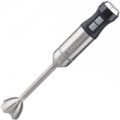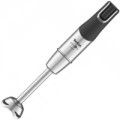Power
The rated power of the device, in fact, is the power of the engine installed in it.
The higher this indicator, the more performant this model is, the more suitable for “heavy” work and the more applications can be provided in the design. For example, in the case of mixers (see “Appliance type”), a power of up to 250 W is considered good for liquid products; for more solid tasks, like kneading tough dough, you should pay attention to more powerful models. Detailed recommendations on optimal power can be found in special sources.
Note that powerful devices are usually equipped with more durable nozzles that can withstand high loads.
One button control
Models of blenders, the control of which is reduced to
one button, and the speed of work depends on the force of pressing. This solution allows you to work with one hand and change the operating modes with the same hand, while the other can fill up the ingredients and not stop the process.
Turbo mode
Turbo mode allows you to significantly increase the speed of rotation of the mixer nozzles for a short time. In this way, unevenness in the whipped product can be quickly and efficiently eliminated, which is especially valuable at the end of whipping. However, note that the turbo mode can only be turned on for a short time, otherwise there is a risk of overheating of the motor.
Capacities
Types of capacities that the device was originally equipped with.
In addition to
the main bowl, the package may include
a bowl for chopping,
a coffee grinder,
a measuring cup and a
travel shaker bowl. All of them are described in detail in this list, with the exception of the shaker — see a separate paragraph below about it.
— Main bowl. The main capacity of an appliance is called the general purpose bowl, and its design varies depending on the type of device. It can be a deep bowl for stand mixers, a jug with knives at the bottom for countertop blenders, or a chopper jar with removable knives for hand blenders and choppers. However, not all appliances come with a main bowl, and in some cases, users are expected to choose their own container.
— Bowl for chopping. Capacity with removable knives is an essential component for chopping products. This container is typically referred to as a grinding bowl, and when it's included in a grinder's delivery set, it's considered the main bowl. However, some devices have a grinding bowl as the main bowl, and knives are a necessary part of its structure.
— Grinder (for coffee). The coffee grinder container is specifically designed for grinding coffee, nuts, spices, sugar, and other products. It usually contains knives similar to th
...ose in blenders, but is distinguishable from the main blender container due to its much smaller volume.
— Measuring cup. The measuring capacity is a transparent glass with a scale that enables the user to measure specific volumes of liquid and bulk products. The accuracy of the scale may vary, but for regular use, it's typically sufficient.Main bowl material
The substance that the jar of the countertop blender is made of (refer to "Device type"), or the material of the blender attachment (refer to "Nozzles"). The most widely used materials are:
—
Plastic. Plastic is a popular choice for blender jars due to its low cost, lightweight, and sufficient strength for kitchen use. Its transparency allows for easy monitoring of the product being blended. However, plastic is prone to scratching, which can cloud the bowl and reduce the device's appearance. Scratches can occur from everyday use or rough cleaning with abrasive products.
—
Glass. Glass blender jars are transparent and allow for easy monitoring of the contents. They are more resistant to scratches than plastic and do not lose transparency during use. Cleaning them harshly does not affect their transparency, and any cloudiness can be easily removed. However, glass is heavier, more expensive than plastic, and is more sensitive to impacts. A glass blender jar can break from a fall that plastic could withstand.
— Metal. Metal blender jars are durable and stylish, often surviving falls without damage. However, they are less convenient than plastic because their opaque walls make it difficult to observe the blending process. Metal is also more expensive than plastic, making it less commonly used, mainly in high-end devices.

